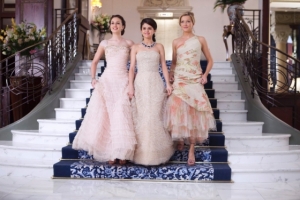For some reason, over the past weekend I had an immediate urge to revisit my 12-year-old self; thus, on Friday afternoon, I drove out to the AMC theater in Burlington (free parking!) to see “Monte Carlo,” the latest teen comedy starring Selena Gomez, Leighton Meester and Katie Cassidy. And while the film was no tour-de-force, not even up there with great teen comedies like “Mean Girls,” I walked out of the theater with a smile on my face (in spite of the half-dozen tweens sitting behind me that spent the ENTIRE time texting and having conversations amongst themselves).
I didn’t expect the film to get good reviews — the script is silly, flat one-liners abound, the acting is laughable — but I did think that most would recognize why this movie would appeal to the 8-14-ish bracket of young girls (and, of course, their accompanying and/or paying mothers). Then, I saw New York Magazine‘s review online, followed by Manohla Dargis‘s review in the New York Times (as well as countless others), and I was puzzled as to how much other tween entertainment these critics are watching.
These are the same kids, maybe with a few exceptions in the younger girls, who are watching television shows like “Pretty Little Liars” and even “Gossip Girl,” where sex, drugs, in-fighting, lying, trickery, and so forth abound. Now I believe that children should be exposed to the gamut of what kind of people live in this world, not to mention I don’t believe in censure of any kind. I just don’t see anything wrong with letting little girls see a movie that indulges their fantasies of pretty clothes, while trying to teach lessons of satisfaction with our own material goods and the ability not to fear the unpredictable nature of life. I’ve seen “Monte Carlo” being accused of being “too wholesome” in some reviews, and I wonder since when did the general public get so jaded to think that kids’ movies desperately need to have sex or alcohol to be worthwhile? I remember most of my favorite movies from childhood were films like “The Sandlot” or “It Takes Two,” both of which have almost no references to sex, drugs, or any kind of seedy underbelly (possibly none, but I’d need to re-watch carefully).
And while I appreciate the great writing that Logan Hill does in the “Monte Carlo” review for New York Magazine (it really is an excellent review) and can agree that there’s something odd about getting young girls to appreciate their own lives by saturating a film with glitzy, glamorous things they’re all going to want, I wonder if Hill misses the point a little. Most of us dream of being something different, and usually that someone is a person that’s more glamorous, richer, has nicer things, can travel to exotic places, etc… If we became that person would our insecurities and idiosyncrasies disappear? Probably not. Children, and especially teenagers, don’t recognize this fact, however; they think that by changing their circumstances, who they are, and the people they attract, will be drastically different. To me, films like this are so important for young people because, unlike something like “Gossip Girl,” there’s a message in the end that says, “Being richer or more glamorous does not make you a more fulfilled person.” And that’s a lesson we all have to learn, and that many teenagers could use earlier in their lives.
One last thing that I appreciated in the film is that the relationships between the three lead females were, thankfully, without much strife. Sure, they didn’t always get along, but they worked it out (as most girl friends that age do). I hate watching movies or television shows about “frenemies” or girls who pretend to be friends but are always trying to sabotage each other. It’s pathetic, and while there are some girls like that out there, I think it’s best we give them as little attention as possible.


